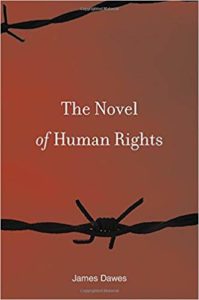The Human Rights Novel: a new book by Professor James Dawes
Contact
The Words: Macalester's English Student NewsletterSenior Newsletter Editors:
Birdie Keller '25
Daniel Graham '26
Callisto Martinez '26
Jizelle Villegas '26
Associate Newsletter Editors:
Ahlaam Abdulwali '25
Beja Puškášová '26
Sarah Tachau '27
Peyton Williamson '27
Laura Berglund ’20

On Thursday, September 20th, members of the English Department and the larger campus community gathered at Common Good Books to celebrate the release of Professor James Dawes’s new book, The Novel of Human Rights.
This book is unlike Professor Dawes’s previous work, which centered on victims and perpetrators of human rights violations as well as the human rights workers who address these violations. It discusses the relationships between literature and how societies commit, enable or respond to this type of crime.

In an interview over email, Professor Dawes shared his inspiration for taking a different approach with The Novel of Human Rights. “[The] fieldwork I have been doing over the past decade or so has always been deeply informed by the novels I read and teach. So it was very interesting for me as literary critic to begin to see how the two seemed to overlap: how the novel as a form was changing in response to the evolution of the modern human rights movement, and how the modern human rights movement was changing in response to the novel as well.”
The intersection between real-world events and writers’ representations of them has the potential to cultivate empathy among readers. While increased visibility and engagement may arise as a result of a novel’s circulation, empathy and failed attempts to generate empathy can be destructive.

Professor Dawes presented some of these issues at the launch party. He argued that empathy in literature diminishes the agency of a given group in the eyes of the reader. A book’s characters need to appeal to readers regardless of the genre, but this practice often results in “safe, appealing, vulnerable victims” in the context of human rights novels.
So how do we, as readers and writers, engage with this genre? My best guess is to recognize and interrogate its limitations while embracing these limitations nonetheless. As Professor Dawes explained at his release, “In these novels, what’s really interesting is they’re novels, so they use the techniques of empathy, but they worry about them and they make that worry part of the story.”